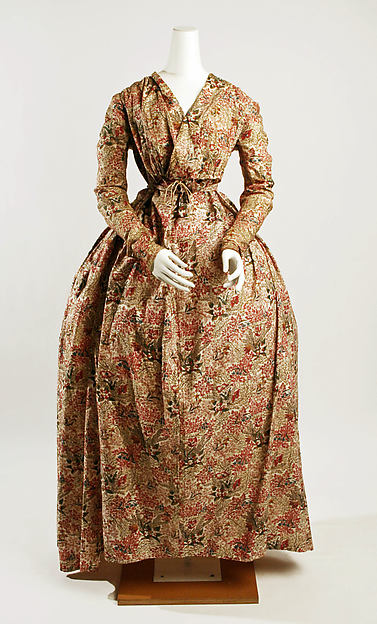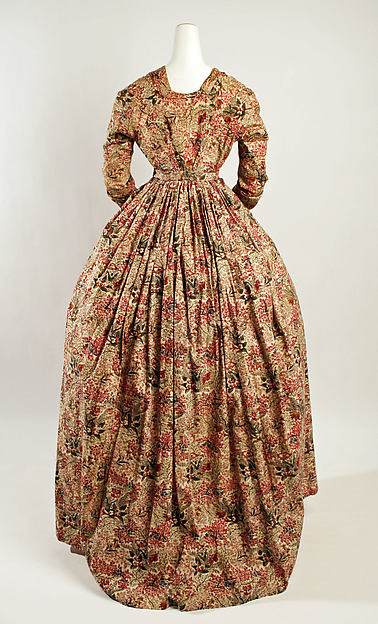I mentioned last week that I'm participating in the Curtain-Along.
I'm going to use the red curtains, and try to reproduce this dress, from
the Met.
The Metropolitan Museum of Art, Accession Number 2004.441 (The pictures of it below are hosted on my Flickr.)
It looks like a plain round gown with a wrap front. I thought it was at
the natural waist, but now I'm thinking it is high-waisted. But on
closer inspection:
(1) The wrap fronts are "floating" away from the waist of the gown.
(2) There is clearly a drawstring tie, but it is centered on the gown, in the middle of the top wrap panel.
(3) There is dress material behind the bodice wrap panels.
I've
been puzzling about this for some time. It's mounted rather poorly
(just look at the skirt!), which does not help. It may have been
worn by a much larger woman than the mannequin as well. I'm not certain
it wasn't rearranged between photographs. And although the zoom function
is powerful, the photos do not have high enough resolution. Possible
solution:
1. The front bodice is a mock wrap. The panels are
stacked onto each other and a single drawstring channel is sewn. Then it
can be drawn up evenly from the middle. It is not attached to the skirt
at all.
2. The skirt is an apron front with dress fabric at
least partly above the waist, so as to keep lining material from showing
in case of gapping. Possibly only slightly gathered for the original
wearer, but gathered more tightly for the mannequin.
My theory:
-->
Regular 18th century apron front gowns had the front skirt just pleated
to a band or tape that tied around the body under the gown. The bodice
dipped below the waist and there was little opportunity for gapping.
However, if this is a brand-new-style high-waisted gown, combined with
the newer straight-waist bodice, there is very great risk of gapping
(particularly on a larger woman), and a new solution comes up: Add extra
material to the skirt front above the waist.
Even with this
theory, I'm still not sure what the underbodice will look like. I need
to look at other very early high-waist gowns and try to find some
construction details. I'm familiar with Regency "apron front" gowns, but
this is different.
I did find a couple of things on
Pinterest. Nothing 100% spot-on for the look, but things that look
similar in construction, and I can see how that dress could have been
intended to look.
I like this one. Long sleeves, still natural waist, crossover. Plus a crazy ruffed undershirt thing and turban!
(Higher resolution here.)
There's a couple of KCI ones that I'd like to look at in more detail.
This is another option: instead of the fronts overlapping, just tying together at the waist.
I'll leave you with one last picture, of the back. Three seams on each side! SO fun. :D
Showing posts with label curtain-along. Show all posts
Showing posts with label curtain-along. Show all posts
Friday, September 21, 2012
Wednesday, September 12, 2012
Join the Curtain-Along!
The blog got away from me! I've had a bunch of Real Life affairs come up. Being a new and inexperienced "official" blogger, I haven't had a buffer of posts to go up to cover my absence. But the plan is to get back on track with my Costume College re-cap in a few days, then to mix up more analysis of my Costume College outfits themselves with other topics.
In the meantime, I wanted to spread the word to check out Jen of Festive Attyre's new Curtain-Along.
Basically, the home improvement store Lowe's is currently selling cotton curtains in an appropriate 18th-century print. The price works out to about $9/yd, which is standard for a good reproduction quilting cotton, and way cheaper than the regular price at Joann's for home dec fabric. There are other sources and other colors, too, in her blog post.
The Curtain-Along isn't a sew-along as such, but it is a voluntary giant group-inspiration project. It's going to be fascinating to see all the different garments that can be made from this print!
Check out Jen's Pinterest board for direct links to the curtains and current projects using the fabric, and her indienne print board for inspiration.
I already have an indienne print cotton gown in a blue and green on white pattern. I'm thinking that RED this time would be a lot of fun! And this 1790s gown from the Met is really starting to intrigue me...
In the meantime, I wanted to spread the word to check out Jen of Festive Attyre's new Curtain-Along.
Basically, the home improvement store Lowe's is currently selling cotton curtains in an appropriate 18th-century print. The price works out to about $9/yd, which is standard for a good reproduction quilting cotton, and way cheaper than the regular price at Joann's for home dec fabric. There are other sources and other colors, too, in her blog post.
The Curtain-Along isn't a sew-along as such, but it is a voluntary giant group-inspiration project. It's going to be fascinating to see all the different garments that can be made from this print!
Check out Jen's Pinterest board for direct links to the curtains and current projects using the fabric, and her indienne print board for inspiration.
I already have an indienne print cotton gown in a blue and green on white pattern. I'm thinking that RED this time would be a lot of fun! And this 1790s gown from the Met is really starting to intrigue me...
 |
| The Metropolitan Museum of Art, Accession Number 2004.441 |
 |
| The Metropolitan Museum of Art, Accession Number 2004.441 |
Subscribe to:
Posts (Atom)











